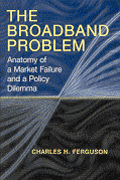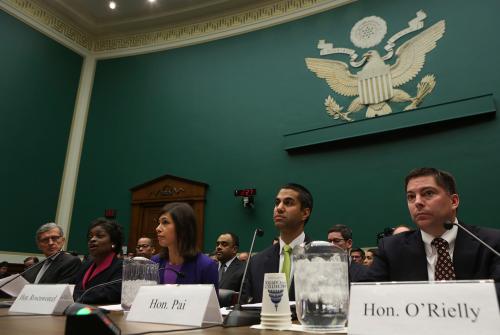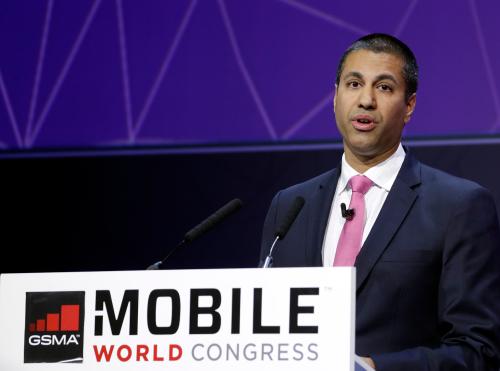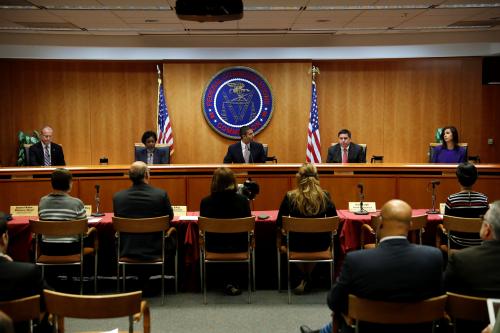On December 14, the Federal Communications Commission (FCC) repealed the 2015 Open Internet Order, which unravels the second round of net neutrality rules prescribed under Tom Wheeler, the former Democratic FCC Chairman and my current colleague.
As of this writing and at least for the next few months, the internet is still working. No web sites have been blocked or throttled.
The civil liberties that some of us enjoyed online yesterday remain intact. By the time that this blog is published, more allegations of sexual harassment will likely be exposed on social media. Trump will tweet and someone will definitely tag him in a response.
The fact that you are reading this blog is a good sign.
The long anticipated repeal of net neutrality under a Trump-appointed commission is just the end of the beginning of debates on net neutrality, restoring internet freedom, and its other labels. It’s also highly likely that a Democratic FCC will upend these rules if court actions extend into the 2020 election—all while decidedly disruptive and innovative technologies continue to change how we globally live, learn, earn, and connect in the 21st century.
Progressives have now taken up the idea that Congress may better serve the future of the internet. The House and Senate now have an opportunity to respond to the millions of commenters that consider internet freedom a public interest. Since bipartisanship has historically worked well on communications policy issues, Congress may be able to resolve the debate and quiet the dogma. They can start by shifting the conversation from applying an outdated regulatory system toward a framework that embraces the evolving online ecosystem where innovation and public interest align.
In this round of the net neutrality debate
The 2017 revival of the net neutrality debate mirrored what was witnessed in both 2010 and 2015—same issues, just different times.
As I explained in a blog post earlier this year, net neutrality advocates are focused on freeing the internet from “gatekeepers”, or large broadband service providers who can block and throttle data to create online “fast and slow lanes.” These perceived betrayals by broadband service providers will lead to first amendment violations, higher subscription rates, and an internet where consumers, content creators, entrepreneurs, and small businesses cannot benefit from the burgeoning digital economy. Underscored by slogans and campaigns focused on saving the internet, the advocates beautifully messaged the apocalypse of internet freedoms to Americans at a time when they do not trust a Trump-appointed FCC majority, or just about anything else associated with this president.
On the other side of the debate are opponents of the heavy-handed rules outlined in the 2015 Open Internet Order. Taking no blame for “breaking the internet,” they successfully reversed the classification of broadband service to an “information service,” thereby rejecting their regulation under the Title II rules that govern common carrier services. Seeking a lightly regulated marketplace, supporters of the repeal also believe that the Federal Trade Commission (FTC), rather than the FCC alone, best serves consumer protection. Despite a pending court decision that currently strips the FTC of its authority over common carriers, both agencies have signed a Memorandum of Understanding to reinstate the FTC’s oversight of the deceptive and opaque practices of big telecom companies (at some point).
Evidently, the fundamental differences between principles versus jurisdictional concerns still permeate this round of the net neutrality debate. The fate of net neutrality is not yet sealed, and it may be litigated in the nation’s highest court.
But the FCC’s decision might also hasten congressional involvement, especially as the 1934 Communications Act (originally drafted to appeal to the growth of radio and telephones) has long exceeded its shelf-life.
While the internet is still working, Congress needs to step in, recognizing that the lines are blurring between broadband service providers (like Comcast, Verizon, and AT&T) and internet companies (such as Google, Amazon, Netflix, and Facebook) within the current ecosystem, especially for consumers. Today, it is probably not in the best interest of broadband service providers to diminish quality of service and access to content due to increased competition. Mobile broadband continues to depress the cost of online access, while free data programs are creating cheaper routes for consumers accessing commercial video streaming services. Social media and other online media companies, such as Facebook and Netflix, realize the necessity of partnerships to distribute their content. At the center of all of these businesses are consumers, who are the ones demanding faster broadband service and more content.
Congress can keep the internet working
Now that the FCC has spoken, Congress should consider the effect of emerging technologies on the internet and avoid the trap of making this purely a political issue. The internet’s future includes commercially viable innovations, such as streaming video and the sharing economy, alongside public interest activities, including telehealth, educational technologies, and workforce development.
Congress must also account for the bandwidth demands of the internet of things, autonomous vehicles, algorithms, artificial intelligence, machines, and drones. Legislation should anticipate use cases where data or content prioritization will be critical for first responders in need of remote medical guidance to save lives or teachers educating students in rural America.
Congress also has the responsibility to assess the impact of the internet’s composite reality on consumer protections and establish guidelines for primary or shared responsibilities between the FCC and FTC. Moreover, legislators should assess whether universal bright line rules that espouse transparency, non-discrimination, and reasonable network and content management should apply to all actors participating in and benefitting from the internet ecosystem.
Clearly, the FCC’s decision has primed the nation for round three of the open internet debate, but this time, Congress should deliver bipartisan legislation that brings certainty and perhaps peace to individuals, large and small companies, entrepreneurs, and a government that desire a flourishing digital economy absent of systemic consumer harms.
Before net neutrality ends up in an inflexible court decision, Congress should step in and advance a framework that balances rather than shames polarized interests.
Amazon, AT&T, Comcast, Facebook, Google, and Verizon are donors to the Brookings Institution. The findings, interpretations, and conclusions posted in this piece are solely those of the author and not influenced by any donation.









Commentary
The internet still works after the net neutrality repeal. Now Congress must act to save it.
December 15, 2017